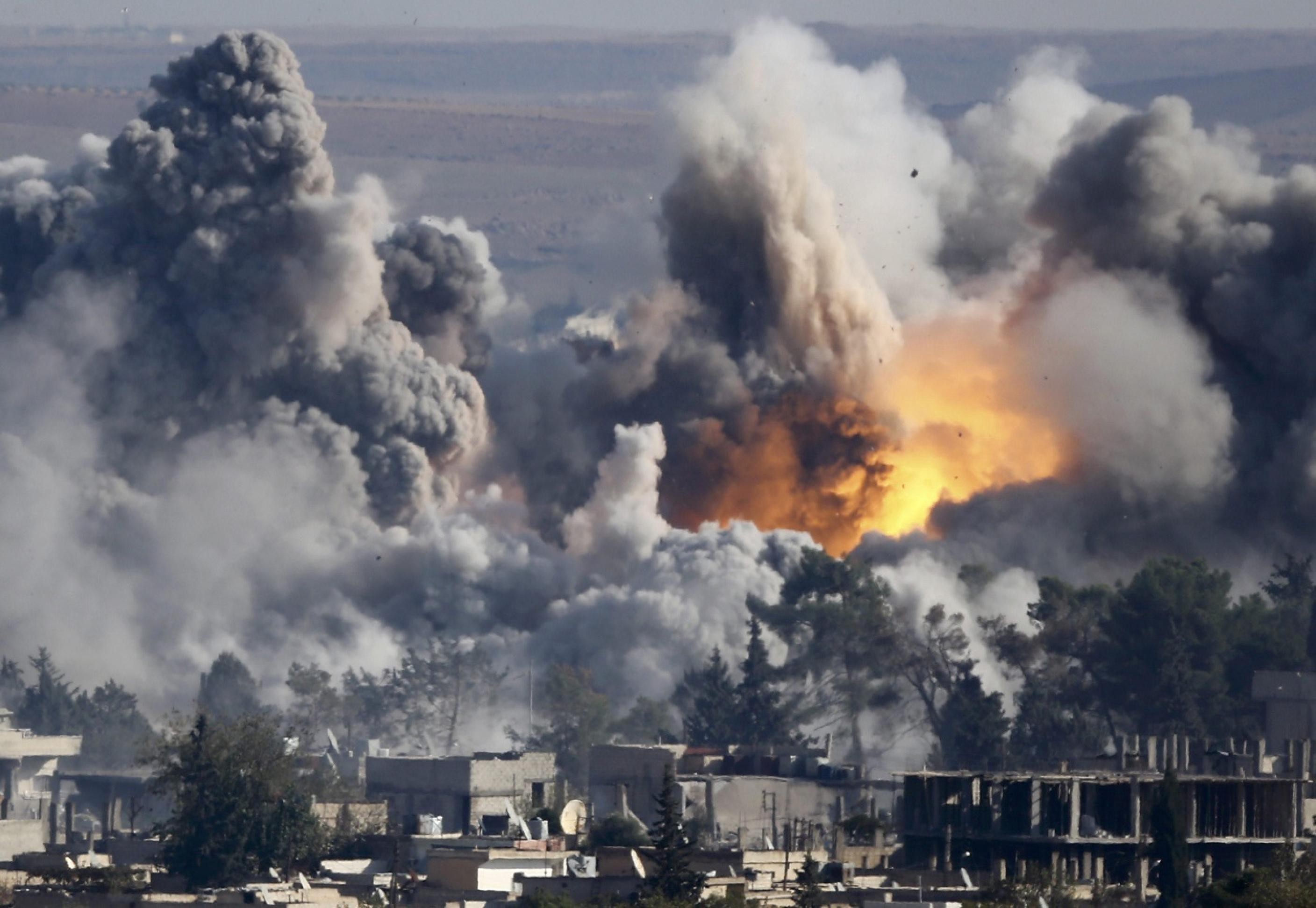When Boss Orders an Act of War,
 |
| The
immediate
aftermath of a coalition airstrike on
Syria in October (Reuters) [Source] |
Flacks Put On an Act for Him
Pentagon’s creative writing in
press release may not
precisely reflect new U.S. actions in Syria and Iraq
A WALL Commentary
The Pentagon’s announcement of a series of bombing raids on Syria and Iraq — ordered by President Joe Biden
without the constitutional authorization by Congress — raised more questions than it answered.
Here are some:
| Baghdad Condemns
Raids
The Iraqi government of Prime Minister Mustafa al-Kadhini called the U.S, air raids a “blatant and unacceptable violation of Iraqi sovereignty and national security.” Iraq’s cabinet described them as “a flagrant violation” of international law. It said Iraq and the United States were in an advanced stage of dialogue on details of removing U.S. combat forces from the country. |
1. Why now?
The statement by the Department of Defense,
issued Sunday, June 27, claimed that the purpose of
the raids that day was “to disrupt and deter an
ongoing series of attacks by Iran-backed groups
targeting U.S. interests in Iraq.” Note the word ongoing.
The day before, on Saturday,
came Biden’s reversal on infrastructure.
He would support the $953 billion bipartisan
compromise, his initial position. On the previous
Thursday, he had told the media it had to be passed
“in tandem” with the Democrats’ $1.8 trillion
American Family Plan. His two flip-flops created a
media uproar.
Could the bombings have been
a way of distracting attention away from Bidien’s
embarrassment? President Clinton
repeatedly used acts of war to distract the media
from his scandals or enhance his political position.
2. The Defense Department’s news release, attributed to John Kirby, press secretary, said the U.S. military forces that evening had conducted “defensive precision airstrikes against facilities used by Iran-backed militia groups” in the Iraq-Syria border region.
Please explain, Mr. Kirby, how it is “defensive” to launch premeditated, sneak attacks on people who never attacked the United States some 6,000 miles away.
3. U.S. warplanes “targeted operational and weapons storage facilities” at two places in Syria and one in Iraq. It was comforting to know that those “precision” operations eliminated just storage facilities. The news release said nary a word about any human beings caught in those “airstrikes.” Was it possible that they struck not a single child, woman, or man?
To the contrary, the Iraqi militia Hasid al-Shaabi said the Iraq attack took four lives, and it threatened vengeance. The Syrian Observatory for Human Rights, based in Britain, counted a death toll of at least seven.
4. “As
demonstrated by this evening’s strikes, President
Biden has been clear that he will act to protect
U.S. personnel.” How does it protect them by
inviting retribution?
Hours
after the attacks, militias seeking revenge launched
rocket attacks on U.S. forces in Syria. They called
it “open war with the American occupation.”
The
U.S. had taken action “designed to limit the risk of
escalation.” So what accounts for the escalation?
Did we expect the targeted groups to take it and
give up?
The
action was also “to send a clear and unambiguous
deterrent message.” Whatever that message said, the
recipients were undeterred.
Iraqi armed groups shelled areas occupied by U.S. forces in Syria, then reportedly called for a state of “calm.”
5. The Pentagon’s mouthpiece went on: “We are in Iraq at the invitation of the Government of Iraq for the sole purpose of assisting the Iraqi Security Forces in their efforts to defeat ISIS.” Not exactly. U.S. forces are in Iraq because in 2003 President George W. Bush conquered it in a Hitlerian blitzkrieg — avidly supported by Senator Joe Biden — and the U.S. has yet to give the Iraqis their independence..
By the way, on June 14,
President Biden gave his support to a proposed
congressional measure to repeal the 2002
resolution
that purported to let the President (Bush) decide
whether to use force against the supposed danger
posed by Iraq (under Saddam Hussein). Three days
later the House of Representatives passed the bill,
sponsored by Rep. Barbara Lee (D-CA). The Senate has
yet to act.
Congress never approved war
in Syria. U.S. forces are there unlawfully.
A question about ISIS (Islamic State of Iraq and Syria): If its defeat is the U.S. goal, why was the Ketaib Hezbollah militia targeted when it too aims at defeating ISIS?
6. The three-paragraph document mentioned three times that the militias were “Iran-backed.” No explanation. No evidence.
The Biden Administration is negotiating with Iran, supposedly aiming to fulfill Biden’s campaign promise to return to the nuclear agreement, rejecting the hostility of the previous administration toward Tehran. So just what are Biden et al. trying to say in these “messages” sent via bomb? “Unambiguous” does not describe them.
The previous “message” of that sort was transmitted on February 25, when at least 22 people in Syria, believed to be members of “Iran-backed militias,” succumbed to Biden’s bombing.
7. “As a matter of international law, the United States acted pursuant to the right of self-defense.” What international law condones a planned, aggressive act against another country as “defense”?
Finally, “As a matter of domestic law, the President took this action pursuant to his Article II authority to protect U.S. personnel in Iraq.” Presumably it refers to the Constitution, which nowhere confers on a president the right to wage warfare without the prior authorization of Congress required by Article I (Section 8).
In 1991, when President George H. W. Bush was planning to attack Iraq for the first time, Senator Biden publicly stated that for one man alone to make the decision to wage war was “tyranny.”
_______________________________________________
By Paul W. Lovinger
July 1, 2021